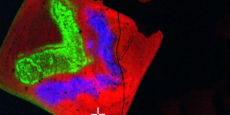
OpenMSI view of two microbes plated on rich LB-agar, captured with nanostructure-initiator mass spectrometry (NIMS). Credit: Katherine B. Louie, Berkeley Lab.
Two years ago, Lawrence Berkeley National Laboratory (Berkeley Lab) researchers developed OpenMSI—the most advanced computational tool for analyzing and visualizing mass spectrometry imaging (MSI) data. Last year, this web-available tool was selected as one of the 100 most technologically significant new products of the year by R&D Magazine. Now, OpenMSI has been licensed to support ImaBiotech’s Multimaging™ technology in the field of pharmaceutical and cosmetic research and development. The Multimaging™ platform essentially allows researchers to combine and overlay different image files that have been acquired from different imaging techniques—like qualitative MALDI imaging, staining and immune staining—to increase confidence in data sets.
With cutting-edge MSI technology, scientists can study tissues, cell cultures and bacterial colonies in unprecedented detail at the molecular level. This information can lead to the discovery of new drug targets, diagnostic tests and more effective drugs. Beyond healthcare, MSI can be applied to industrial biotechnology, plant agriculture, veterinary medicine, forensic investigation, environmental toxicology, combatting terrorism, even exploring the universe. However as MSI datasets have grown from gigabytes to terabytes, basic tasks like opening a file or plotting spectra and ion images became insurmountable challenges for the average scientist.
To help researchers overcome these challenges, two Berkeley Lab researchers—Oliver Rübel of the Computational Research Division (CRD) and Ben Bowen of the Environmental Genomics and Systems Biology (EGSB) Division with support from the National Energy Research Scientific Computing Center (NERSC), conceptualized and developed OpenMSI. This work was part of a larger effort at Berkeley Lab to extend advanced computational techniques to science areas (and scientists) that haven’t benefitted from them in the past. The tool, which makes highly optimized computing technologies available to researchers via a user-friendly interface, was born from the Lab's Integrated Bioimaging Initiative, and initially developed with funds from NERSC and the Laboratory Directed Research and Development (LDRD) Program at Berkeley Lab. NERSC is a DOE Office of Science User Facility.
Because OpenMSI leverages NERSC’s resources to process, analyze, store, and serve massive MSI datasets, users can work on their data at full-resolution and in real-time without any special hardware or software. They can also access their data on any device with an Internet connection.
“OpenMSI has really been a grassroots effort. We always believed that OpenMSI would be a transformational technology, so we worked with Berkeley Lab’s Innovation and Partnerships Office early on to protect the Lab’s intellectual property,” says Rübel.
“This licensing agreement is certainly a great achievement towards achieving our vision of transforming mass spectrometry imaging research and applications through computing, but we still have a ways to go to fulfill our vision and to fully develop OpenMSI and achieve broad adoption,“ adds Bowen.
ImaBiotech is a contract research organization that offers services in mass spectrometry imaging. Headquartered in Lille, France, the company also develops and implements new imaging technologies. The company announced its agreement to license the intellectual property of OpenMSI in an April 14, 2016 press release.
For more information:
OpenMSI: A Science Gateway to Sort Through Bio-Imaging’s Big Datasets
OpenMSI Wins R&D 100 Award
ImaBiotech Signs Licensing Agreement with Lawrence Berkeley National Laboratory
About Berkeley Lab
Founded in 1931 on the belief that the biggest scientific challenges are best addressed by teams, Lawrence Berkeley National Laboratory and its scientists have been recognized with 16 Nobel Prizes. Today, Berkeley Lab researchers develop sustainable energy and environmental solutions, create useful new materials, advance the frontiers of computing, and probe the mysteries of life, matter, and the universe. Scientists from around the world rely on the Lab’s facilities for their own discovery science. Berkeley Lab is a multiprogram national laboratory, managed by the University of California for the U.S. Department of Energy’s Office of Science.
DOE’s Office of Science is the single largest supporter of basic research in the physical sciences in the United States, and is working to address some of the most pressing challenges of our time. For more information, please visit energy.gov/science.









